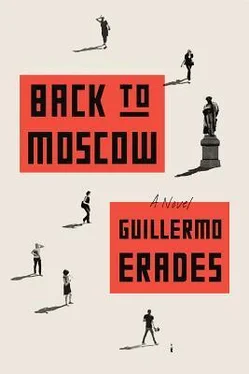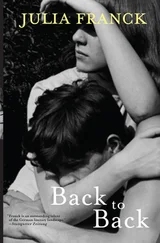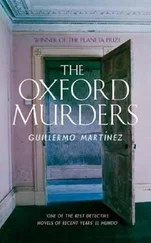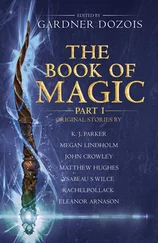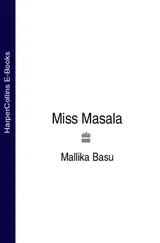‘To Ira!’
Sergey kissed Ira. We all drained our glasses of vodka and placed them back on the table.
Sergey did not correspond to the image of Sergey I had formed in my mind. Ira had told me how he’d quit university to become a professional photographer, and for no particular reason I’d imagined him tall, blond, Slavic-looking. But Sergey was short and dark-haired, with black eyes and thick eyebrows. His chin was black with stubble. I imagined he must have some Caucasian background, Georgian or Armenian perhaps, but I decided not to ask.
‘Kushaite, kushaite,’ Sergey’s mum was telling me, ‘you need to eat. Take some salatik.’
‘Thank you, Aleksandra Olegovna,’ I said. ‘This looks very nice.’
‘I feel so old,’ Ira said. ‘It was only yesterday that I finished school and here I am, almost done with university, with a new job. Life goes so quickly.’
Sergey was now refilling the glasses with more vodka.
‘If you only knew,’ Aleksandra Olegovna said. ‘One day you wake up and realise your life is almost gone and what have you done with it? Nothing. Because there is nothing you can do. We just survive year after year as we get old—’
‘Mama, don’t start,’ Sergey interrupted.
‘I remember when I was your age as if it were yesterday,’ Aleksandra Olegovna continued, looking at Ira. ‘Of course things were different back then. I already had my little Seryozhka.’ She placed her hand on Sergey’s shoulder.
Sergey shook off his mother’s hand and stood up. ‘Dear friends,’ he said, ‘I would like to propose another toast. Let us drink now to peace and friendship among the peoples of the world.’
We raised our glasses and, as I was about to pour the vodka down my throat, I realised with panic that everybody was staring at me. It struck me that I was somehow considered by those around the table as a kind of international envoy to Ira’s birthday. For a few seconds I wondered if I was expected to give an acceptance speech in return for the toast. My Russian wasn’t up to the task, I decided, so I just raised my glass again, smiled and glanced around the table, indicating with my silent but sincere gesture that I was honoured to accept the toast on behalf of my fellow non-Russians of the world.
We drained our glasses and soon the conversation split into different groups.
A few minutes later Sergey opened the bottle of French wine I’d brought and poured it into the water glasses around the table.
‘This is great,’ he said. ‘French wine. Where did you get it?’
‘I bought it in Eliseevsky, they have a wide selection.’
‘Oh, but it’s so expensive in there,’ Aleksandra Olegovna said.
‘I hope you like Bordeaux,’ I said.
I held the glass under my nose. The wine had a pleasant aroma, woody and sweet. I had indeed invested a significant amount of time and money in procuring the bottle. It wasn’t the kind of wine you could find in metro shops selling cheap Moldovan and Georgian varieties.
‘We love French wine,’ Sergey said. ‘The best. This toast,’ he went on, raising his glass of wine, ‘I would like to dedicate to Ira’s parents, who can’t be here today, and to all of our parents.’
‘To our parents!’
They all raised their arms and, to my horror, drank the Bordeaux as if it were a shot of vodka, in two, three gulps.
‘That was a great wine,’ Sergey said, wiping his mouth with the back of his hand. Then he took a bite of black bread.
‘This was an excellent wine,’ Ira said. ‘Thank you, Martin.’
‘Much better than the Moldovan crap we normally get,’ Ira’s cousin said.
Aleksandra Olegovna was looking at my glass. ‘Martin, why don’t you drink your wine?’
With the aged Bordeaux in my hand, I hesitated for a moment. Now everybody was staring at me in silence. I forced a smile, took a deep breath and drank the wine in one.
‘So,’ Sergey said, ‘Ira tells us that you are doing some research on Russian literature?’
Ira placed her hand on my shoulder. ‘Martin is trying to figure out why Anna Karenina throws herself under a train.’ She laughed.
‘It’s about how Russian heroines behave,’ I said, slightly annoyed that nobody seemed to take my research seriously. ‘I’m first trying to identify some common characteristics between Russian heroines and real Russian women.’
‘That sounds very interesting,’ said Aleksandra Olegovna. ‘How do you like our dear Pushkin?’
‘Pushkin,’ I said, ‘of course.’ I was thinking which of the stories proving my devotion to Pushkin I was going to tell, pondering if reciting a few verses would be appropriate at this point in the evening, when Ira’s cousin stood up, clinking his glass with a fork.
‘Let me propose another toast,’ he said, in a sombre tone. ‘All of us around the table are good people with big hearts.’
Ira looked at Sergey and rolled her eyes.
‘Today,’ Ira’s cousin continued, ‘we are celebrating Ira’s birthday. It’s thanks to Ira that we are here today, and if so many good people are around the same table because of Ira, well, that means that Ira herself is a great person.’
I wasn’t sure I had understood everything right.
‘Of course I am a great person,’ Ira said.
We all laughed.
‘To friendship!’ Ira’s cousin said, raising the vodka in his right hand, and hovering his left hand over the rest of us, as if to indicate that the effects of the toast were limited this time to friendship among those present in the kitchen.
‘Thank you, thank you,’ Ira said.
‘That’s beautiful,’ Aleksandra Olegovna said with tears in her eyes.
We drank up.
Soon, the three bottles of vodka were empty and three more bottles appeared on the table.
Someone told an anekdot and, although I understood all the sentences, I couldn’t figure out what was funny about it. But I nodded along to the story and, when everybody laughed, I joined in. Suddenly, the thought of being in Ira’s kitchen laughing at a Russian joke I hadn’t got seemed hilarious to me. To my surprise, my forced chuckle turned into real laughter, which in turn made everybody else laugh louder.
Sergey patted my back, seemingly in approval.
As we continued drinking, my understanding improved significantly. At some point I found myself totally immersed in the Russian conversation, almost unaware that I was speaking a foreign language. It was not that I knew more words, but I seemed more able to grasp the overall narrative — filling in the language gaps with my own drunken version of whatever was being said at the table.
Sergey put an arm around my shoulders and said, ‘I really respect you.’ He then thanked me for helping Ira with her English. ‘You are such, such a nice guy. You could be Russian.’ He stared at me in silence. His breath smelled of vodka and herring.
‘Spasibo,’ I said, smiling.
Sergey’s gaze was somehow lost in a space behind my head, and for a second I was afraid he was about to hug me or kiss me, but at that moment Ira’s uncle stood up on the other side of the table and proposed a new toast. This one to the women in the room, to their beauty and their pure hearts, and to something else which I didn’t get but included, I thought, the Russian word for air or for breathing. We all drank up and had a bite of bread and salad.
‘So,’ I said, turning to Sergey, ‘Ira told me you are now working on a project, black and white photos.’
‘Not black and white — I’m using different tonalities of grey. With loads of shadows. It’s a series I’ve called Moscow’s Soul .’
‘Interesno,’ I said, digging my fork into my mushroom salad.
The salad tasted of damp earth and fresh dill, and, as I swallowed, I was overcome by a tide of positive feelings towards my physical surroundings. I glanced around the kitchen, my eyes unable to focus on any particular point, and I perceived everything in a warmer light — a blurry vodka gleam cast over the salad bowls, the flowery tablecloth, the rattling fridge, the flowers in the kitchen sink, the reddened faces of the other guests. It felt as if all the parts of the kitchen had become one single entity — coherent and meaningful. Then, peering through the window into the darkness, I discerned the crazy air-bound dance of fresh snowflakes.
Читать дальше
